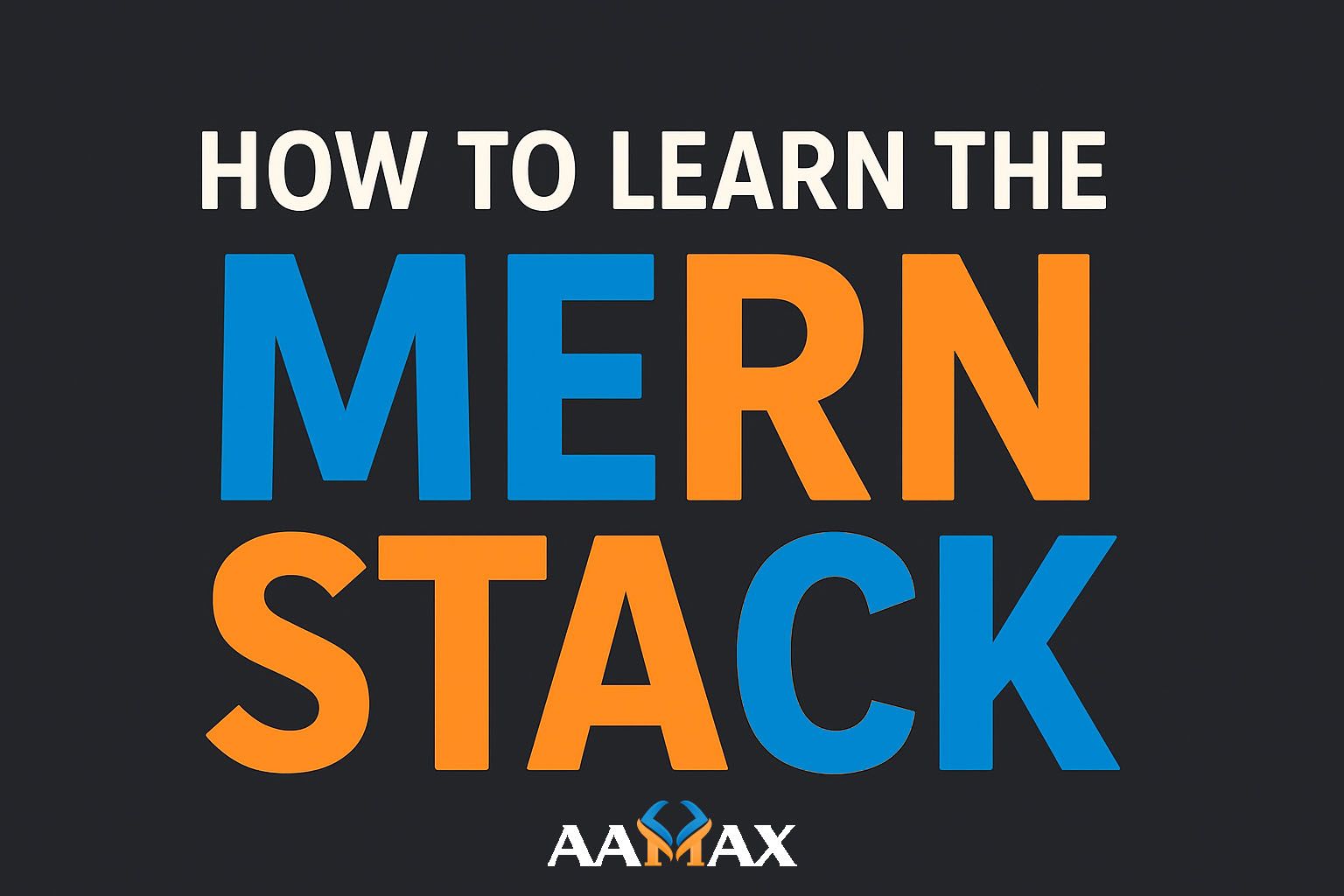
How To Learn the MERN Stack
Learning the MERN stack (MongoDB, Express.js, React, and Node.js) is one of the best ways to become a full‑stack JavaScript developer. The MERN stack helps you build dynamic, scalable, and modern web applications using JavaScript end‑to‑end---from database to browser. In this in‑depth guide, you will learn what the MERN stack is, why it's so valuable, and a complete roadmap that helps you master it effectively.
If you need professional help building or scaling MERN‑based applications, you can hire AAMAX, a full‑service digital marketing and development company offering Web Development, Digital Marketing, and SEO Services.
What Is the MERN Stack?
MERN is an acronym for four technologies that work together to build full‑stack web applications:
- MongoDB -- A NoSQL database that stores data in JSON‑like documents.
- Express.js -- A Node.js backend framework for building APIs.
- React -- A frontend library designed for building dynamic user interfaces.
- Node.js -- A runtime environment for executing JavaScript on the server.
Each part of the MERN stack plays a critical role in how applications work. Because all layers rely on JavaScript, developers can build both frontend and backend solutions without switching languages.
Why Learn the MERN Stack?
The MERN stack is one of the most in‑demand skill sets in modern web development. Here are some reasons why learning it is worthwhile:
- One Language for Full Stack: JavaScript is used across all components.
- High Developer Demand: MERN skills are highly marketable.
- Scalable Applications: MERN structure supports enterprise‑level growth.
- Flexible Architecture: Easy API development and modular design.
- Rich Ecosystem: Countless libraries, tools, and learning materials.
Many tech companies---from startups to enterprises---use the MERN stack for building user‑centric web solutions due to its speed, scalability, and developer‑friendly nature.
Learning Roadmap for the MERN Stack
Below is a comprehensive roadmap to help you learn MERN effectively.
1. Learn HTML, CSS, and JavaScript
Before diving into MERN, understand the basics of web development:
- HTML5: Semantic structure, elements, forms, metadata.
- CSS3: Layout, Flexbox, Grid, responsiveness.
- JavaScript Fundamentals: Variables, functions, loops, arrays, objects, arrow functions.
You should also learn foundational environment knowledge:
- Browser dev tools
- DOM manipulation
- Fetch API
Mastering JavaScript is critical because you will be using it everywhere in MERN.
2. Master JavaScript ES6+
Modern JavaScript features are necessary for MERN development:
- Template literals
- Spread/rest operators
- Destructuring
- Promises
- Async/await
- Classes and modules
Most React and Node.js code is written using ES6+ syntax, so proficiency here will pay off significantly.
3. Get Comfortable With Git and GitHub
Version control is essential for collaboration and deployment. Learn:
- Git basics (commit, push, pull)
- Branching workflows
- Pull requests
- Repository management
4. Learn Node.js
Node.js allows JavaScript to run on the backend. Key concepts include:
- Node.js environment
- Built‑in modules (fs, http, path)
- npm (Node package manager)
- Event loop
- Streams and buffers
Understanding Node.js is essential before working with Express.
5. Learn Express.js
Express.js is a lightweight Node.js framework designed for backend development and API creation. You should learn:
- Middleware
- Routing
- Request/response lifecycle
- REST APIs
- Error handling
- Authentication basics
A common example is building CRUD APIs with Express.
6. Learn MongoDB
MongoDB is the NoSQL database used in MERN. Key concepts include:
- Collections and documents
- CRUD operations
- Aggregation
- Indexing
- MongoDB Compass
- MongoDB Atlas
You should also learn Mongoose, a popular MongoDB ODM used to define models and schemas.
7. Learn React.js
React powers the frontend of the MERN stack. Key fundamentals include:
- JSX
- Functional components
- Props and state
- Lifecycle methods
- Hooks (useState, useEffect, etc.)
- Context API
- React Router
React also supports reusable components that speed development.
8. Learn State Management
For larger projects, mastering state management becomes important. Options include:
- Context API
- Redux
- Zustand
- Recoil
Redux remains very common in enterprise apps.
9. Learn How to Connect Frontend and Backend
Once you know both Express and React, connect them by:
- Building REST APIs
- Fetching APIs using Fetch or Axios
- Managing authentication (JWT)
10. Build CRUD Applications
CRUD (Create, Read, Update, Delete) projects help apply concepts end‑to‑end. Examples:
- Blog
- Task manager
- Notes app
11. Authentication & Authorization
Mastering authentication is crucial. Learn:
- JWT
- Cookies & sessions
- Protected routes
12. Deployment
Learn how to deploy MERN apps:
- Render
- Vercel
- Railway
- MongoDB Atlas
Deployment skills help you put your projects online so others can use them.
Project Ideas for Practice
Beginner MERN Projects
- Simple to‑do application
- Contact list
- Personal notes app
Intermediate MERN Projects
- Blog website
- Photo sharing app
- Real‑time chat
Advanced MERN Projects
- E‑commerce platform
- Social media app
- Project management tool
Building increasingly complex projects helps reinforce concepts.
Tips for Learning MERN Effectively
- Practice consistently
- Learn by building real projects
- Join online communities
- Follow industry news
- Contribute to open‑source projects
Recommended Tools
- VS Code
- Postman
- MongoDB Compass
- GitHub
- Node Version Manager
- Browser DevTools
Common Mistakes to Avoid
- Skipping JavaScript fundamentals
- Jumping directly into React
- Avoiding backend security
- Not learning deployment
- Not using Git
Learning MERN requires patience, but the rewards are well worth it.
How Long Does It Take To Learn MERN?
Learning timelines vary depending on your pace:
- Beginner: 6--9 months
- Intermediate: 3--5 months
- Experienced developer: 2--3 months
Consistency and practical work are more important than theoretical study alone.
Career Opportunities After Learning MERN
Job roles include:
- Full‑stack developer
- Frontend developer
- Backend developer
- Software engineer
MERN skills are relevant to companies worldwide.
Conclusion
Learning the MERN stack is one of the most valuable steps you can take in your web development career. With JavaScript from end to end, MERN enables you to create powerful and scalable applications used across countless industries. By following the structured learning roadmap outlined in this guide---starting with JavaScript fundamentals and progressing through Node, Express, MongoDB, and React---you can become a confident full‑stack MERN developer.
If you need expert assistance building MERN‑powered applications or want professional web development support, hire AAMAX for MERN Stack Development services. Their team also offers Web Development, Digital Marketing, and SEO Services to help your business grow.







